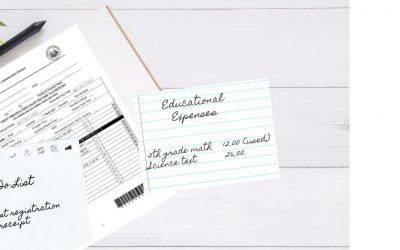In order to comply with the 18-8-1(c)(2) exemption from compulsory education in West Virginia (the path most commonly followed by homeschool families), we are simply required to file a Notice of Intent for each child we’re teaching and then complete an annual academic assessment, usually a nationally-normed standardized achievement test in five subject areas, or else a portfolio review.
Championing an Eternal Perspective
Perhaps the biggest shortcoming of our annual assessments, though, is that they cannot capture the most important measures of success. For instance, these assessments fail to measure creativity and critical thinking. Desirable qualities such as civic-mindedness, compassion, and reliability are not included. Neither are characteristics like honesty, an exemplary work ethic, or kindness.
We complete our annual assessment to follow the law – as God requires. Sure, it’s good to have a measure of our child’s academic progress in reading, math, language arts, social studies, and science, but it’s even more important to keep Biblical priorities foremost.
Did we meet character and spiritual goals?
So, let’s come at this from another angle, closer to God’s point of view. God explains that, while we look on the outward appearance, He looks on the heart. Besides our academic goals for the upcoming grade level, how about including goals like completing daily chores without complaining, having a cheerful attitude during school work, and keeping school supplies organized? Or might we consider having our students read more advanced books, complete a certain number of nonfiction works, or contribute to a book club discussion? For a believing child, we might set such goals as putting Biblical principles into action: e.g., a heart to give rather than receive, cultivating a teachable heart, or pursuing a deeper relationship with the Lord through a wholehearted prayer life.
With summer planning time on the horizon, consider spending some time discussing and praying together about each individual child. Start with a list of all the things about each child that are positive and for which you are thankful. Make this list long and praise God for His goodness! Then intentionally share this list with your child :-).
Afterward, make a short list of character areas where your child needs growth. This, then, could translate seamlessly into measurable goals, making a second, more personal yet highly meaningful year-end assessment pretty simple.
For example, let’s say you are concerned because 12-year-old Sally never reads unless required to; spends evenings on social media; rarely, if ever, helps Mom without being asked; does not make her bed or keep her clothing hung up; and argues with Dad when she doesn’t get her way.
Goals and Tools
Goals, then, for Sally this coming year could include:
- Daily Scripture reading. Tools: Dad will give the entire family a schedule of short readings, and will try to discuss them at least weekly at the dinner table. Mom and Dad will make every effort to make this time enjoyable and pleasant with the goal of seeing Sally enjoy and engage with Scripture.
- Read for pleasure. Tools: Go to the library every other week and allow Sally to check out two books. Require the reading of two substantial books per quarter; keep a record of titles and date completed. (Hope to see her pick up extra books on her own.) Mom and Dad will model reading in the evenings more often. At least 15 minutes daily reading required prior to internet use.
- Participate joyfully in chores and work, initiate without being asked. Tools: Establish household routines that include Sally keeping her own room picked up daily, and require her to help Mom with daily and weekly chores. Mom and Dad will “notice” her progress and give praise.
- Learn that nothing is gained by arguing = eventually a cooperative and respectful daughter. Tools: Mom and Dad will hold to what they tell Sally and not give in to her arguments. Disrespectful argumentation will automatically, consistently (but gently) yield one or more day’s loss of social media time, friend time, or computer/DVD time. (This will be an automatic consequence without Mom or Dad getting angry about it.) Both Mom and Dad will pray over this consistently, and also be cautious about their own argumentative attitude.
- Cheerful and happy home life. Tools: Mom and Dad will make every effort to notice the good things Sally does and to promote a cheerful attitude in the home – while still holding firm to the things needed to help her mature.
Character Assessment Program – Gauging Progress
At the end of the year, parents can sit down and see:
- Is Sally reading the Bible consistently by the end of the year? Does she seem to enjoy it yet? Has she done any Bible study on her own in addition to the required reading?
- Has she read the required books? Any additional books on her own?
- Has she established habits for daily chores? Are these being completed routinely without reminding or nagging? Does she ever help Mom without being asked? Are Mom and Sally able to work cheerfully together at least some of the time?
- Is Sally more respectful with Dad?
When we can look back at where we started, it helps us not forget the progress made! It’s so easy to constantly notice the problems and overlook the good. Not only is this unfair, but it’s also discouraging to our kids. After all, parenting is much more akin to a crockpot than a microwave! In the midst of correcting the sons and instructing the daughters God has given you, discipline yourself to notice and celebrate each child’s slow but steady progress.
This coming year, consider preparing for an assessment that goes beyond academics!





Recent Comments